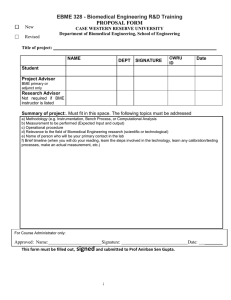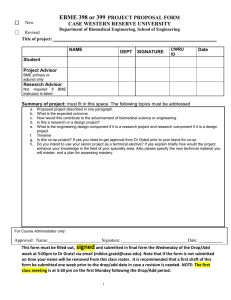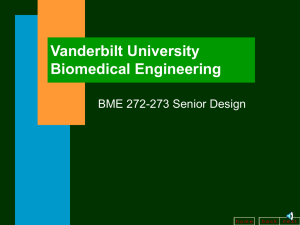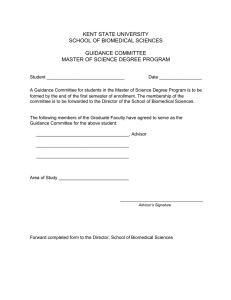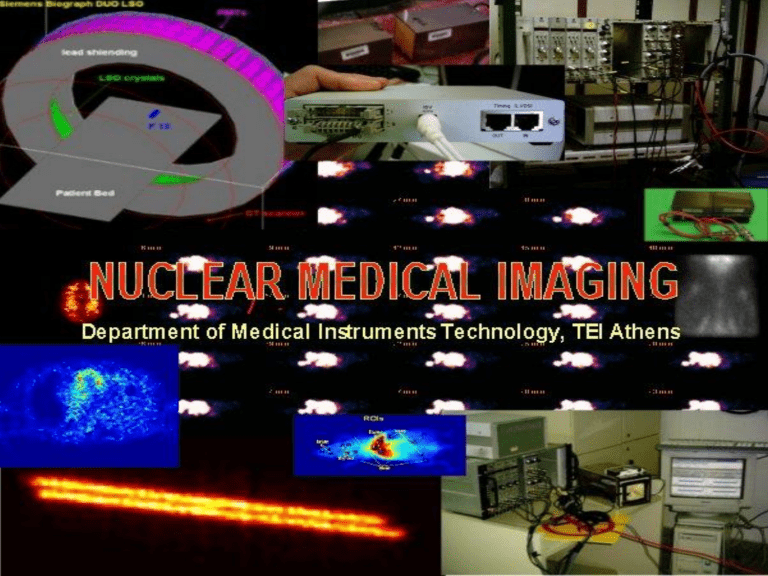
Msc Informatique, Synthèse d’Images et Conception Graphique (ISICG) with direction Internet and Multimedia Technologies Joint Master Programme by TEI of Athens, Greece, and the University of Limoges A.Tsoukalis, G.Loudos Dept of Biomedical Technology Engineering TEI Athens What’s Biomedical Engineering(BME) ? Biomedical engineering (BME) is the application of engineering principles and design concepts to medicine and biology for healthcare purposes. * for example diagnostic or therapeutic* What’s Biomedical Engineering(BME) ? This field seeks to close the gap between engineering and medicine. It combines the design and problem solving skills of engineering with medical and biological sciences, in order to advance health care treatment, including: Diagnosis Monitoring , and Therapy. Why 3d-Visualisation for biomedical engineering systems is viable and necessary ? Categories that 3D development in BME is viable and necessary: Education (Academic + Professional) Advertisement/Marketing System installation in medical environment(Topology) Engineering Design Options in industry(try out different Setups/Geometries for no cost) Education Using 3D and virtual reality environments as part of training methodology allows students or application specialists (workforce) to experience an entirely new side of training. Real life scenarios can be implemented as : normal functioning , maintenance and quality Control. Education BME students or application specialists can be trained and evaluated on the physical principles on which the functionality of medical equipment is based. This type of technology breathes life back into traditional computer based learning and re-awakens the enthusiasm in users who are used to this technology in other circles outside of training. Advertisement/Marketing Combination of high-end technology and creativity can give an opportunity for a reboot to the marketing problem many companies are facing. Interactive Combination of 3D geometries, internet marketing is an effective commercial strategy. System installation in Medical environment Simulation of system Motion and Location according to it’s environment can prevent non expectable errors in the biomedical engineering field of technology As an example: possible collisions with surrounding geometries in order to avoid system installation fail Engineering Design Options in Industry Simulation/Modeling gives the opportunity for system designers to test different design options. So design specifications are met by using virtual prototypes rather than physical experiments. X-ray Scanner , Computed Tomography(CT) Positron Emission Tomography (PET- Modality) Aim of the Project The development of a virtual laboratory, which describes 10 medical instruments of biomedical engineering and their related physical processes. Project Requirements for (VILBE) Educational tool - Easy to use- User friendly Accessible via internet – browser/web app Self-guidance through the 3d world Interaction with the system environment Advantages of Blender in this Project • Compatibility with other apps(flexible) through exports . • Python (Object oriented language) • Open Source !!! • User Friendly GUI / Easy to Learn-Use • Interactive Blender Community • High End Capabilities for Graphics/ Realistic Models Workflow/ Methodology of the Project part by part Achieving a well “in depth” knowledge of biomedical engineering machines, since they are composed from a large variety of different parts of different scale. Workflow/ Methodology of the Project part by part Achieving a well “in depth” knowledge of biomedical engineering machines, since they are composed from a large variety of different parts of different scale. Workflow/ Methodology of the Project Starting with the smaller and most complicated parts, the first geometrical approach is done in blender , using basic meshes and curves. Workflow/ Methodology of the Project Finally the complete mesh is exported in .3ds form so it can be applied as class .as3 to be developed in flash code, in order to have an interactive geometry with output results in a database (website). i) A realistic MRI for clinical use ii)Basic Geometry of the machine in Blender iii) After the export, in flash code, in the fully interactive web browsing application Workflow/ Methodology of the Project A realistic MRI for clinical use Basic Geometry of the system in Blender After the export, in flash code, in the fully interactive web browsing application Results ! Results ! Results ! Some of the most complicated machines are now interactive, by being separated to partitions, so we can peer though the exterior and take a look into the interior side. In addition there is a “turn based” disappearing tool , in which part by part can be explained or in exercises take a form of data. Future Plans Make it a stand alone Blender project (Game engine) Expand the variety of the systems (requires feedback , knowledge basis from engineers and a funding ) Future Plans At this stage the Virtual Lab is an educational tool , but it can be upgraded-expanded to a professional/ commercial specific implementation for anyone’s needs. ( F.e. Chemistry – physics visualization). Acknowledgements G.Loudos ( Organizer) Blender Community – Tutorials Guides Creators of Blender Institution (Technological Educational Institute of Athens) – Establishment References of our work http://medisp.bme.teiath.gr/vlab/ (site being updated) http://www.bme.teiath.gr/ni/EnglishVersion/nuc_e ngl.html Thank you for your patience !

